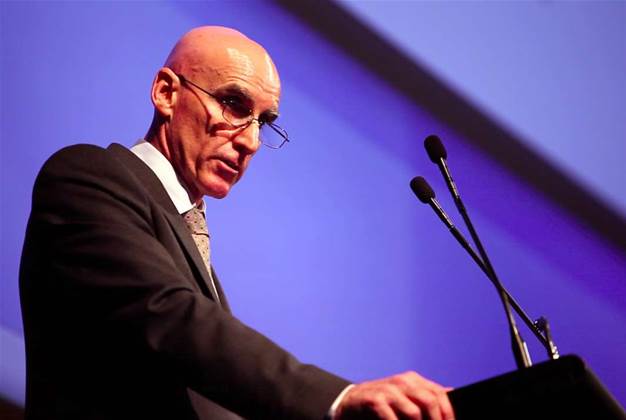Former NBN Co CEO Mike Quigley has railed against the narrative created by communications minister Malcolm Turnbull around a 'mismanaged' NBN handled by an 'inexperienced' executive team.

In his first major speech since resigning from NBN Co, Quigley warned the new management at NBN Co that they would face many of the same challenges he and his now largely-deposed executives had faced.
Quigley retired from NBN Co in July this year. He was a regular target of the now-communications minister, who criticised Quigley for not having the knowledge or construction experience to execute the NBN project.
"Mr Quigley has not been pushed out because he's been doing a good job," Turnbull said after Quigley's resignation. "He's been pushed out of the company because it has not succeeded in meeting its targets."
Months later, and now at arms length from the company, Quigley found his voice at a TelSoc soiree.
"This wasn't a project where hedging your bets, sandbagging and conservatism was going to work," he said.
"This was a big, ambitious project that required setting of aggressive targets - and a management team that were prepared to drive the company to hit those targets."
Quigley said the NBN Co management team under his watch wasn't "naively optimistic", and contrary to Turnbull's criticisms had a "good deal" of experience building telecommunications networks.
"Was it likely that we were going to hit all of the targets we set ourselves, given the complexity and scale of the project, and the number of issues that were outside our control? Of course not, but the NBN Co management team decided it was not going to play the game of setting low targets," Quigley said.
One thing Quigley said he and his executives had no control over was the delivery timetable they were held to.
The new NBN Co management will face similar issues, after being given directives from the new government on when Australians might receive 25Mbps fibre-to-the-node connections.
Interim NBN Co CEO Ziggy Switkowski has already noted the delivery timetable looks "very, very demanding".
Coalition 'impeded' NBN
Quigley called out the Coalition over what he saw as a "deliberate effort" to impede the progress of the NBN.
He specifically pointed to assertions by the Coalition in April 2012 that buying satellites without securing orbital slots put the entire satellite portion of the project at risk.
Quigley downplayed the risk at the time as "very, very small" but NBN Co was forced to seek public assurances from the International Telecommunications Union (ITU) that buying satellites before securing orbital slots was prudent and normal.
Quigley told TelSoc the issue led to "hours of questioning and debate". He accused the Coalition of raising it to deliberately hinder the NBN's progress.
He said NBN Co had followed "stock standard" ITU processes in planning to launch satellites.
"If we had given way to this pressure, the only outcome would have been to delay the provision of a better satellite service to those Australians who so desperately need it," Quigley said.
"Unfortunately, not all the distractions could be pushed aside, as we did with this satellite example. Which is a pity, because there is no doubt in my mind that NBN Co would have been more successful if it had enjoyed bipartisan support."
Contract rates
Quigley also said NBN Co had been prepared to pay its contractors more for brownfields rollout work using "cost reductions" gleaned from other areas of the project.
The former CEO was dogged by the issue of pay rates negotiated with its construction partners - an issue seen as one of the key reasons why NBN Co was not hitting its premises passed targets.
Quigley said NBN Co had been quietly addressing the issue. "Were we prepared to increase rates when there was evidence that the negotiated rates were too low? Yes we were," he said.
"We were also prepared to compensate, pay variations or provide extensions or relief for problems over which our construction partners had little control, such as delays caused by NBN Co in getting all the database issues sorted out for the top-level designs."
He said substantial cost reductions had been identified and were ready to be executed to pay for the rate hikes to contractors.
Things like "smaller diameter cables, reduced and more efficient testing, smaller footprint multi-ports, reductions in fibre counts and corrections in planning tools" had netted savings that could be redistributed to contractors, meaning the project overall did not blow out.
"Rates to build the fibre network based on the existing design and architecture were rising," Quigley said.
"But those rate increases would not have produced a cost increase because we had identified and validated, network and design changes that would have offset those increases."
In any event, NBN Co had a capital expenditure contingency of about $3.6 billion built into its corporate plan.
"If the management team had any doubt about offsetting the increased rates [to contractors] by the cost reductions we had planned, we would have made use of some of that contingency."


.png&h=140&w=231&c=1&s=0)
_(20).jpg&h=140&w=231&c=1&s=0)
_(23).jpg&h=140&w=231&c=1&s=0)
_(28).jpg&h=140&w=231&c=1&s=0)





 iTnews Executive Retreat - Security Leaders Edition
iTnews Executive Retreat - Security Leaders Edition
 iTnews Benchmark Awards 2026
iTnews Benchmark Awards 2026
 iTnews Cloud Covered Breakfast Summit
iTnews Cloud Covered Breakfast Summit
 The 2026 iAwards
The 2026 iAwards











_(1).jpg&h=140&w=231&c=1&s=0)



